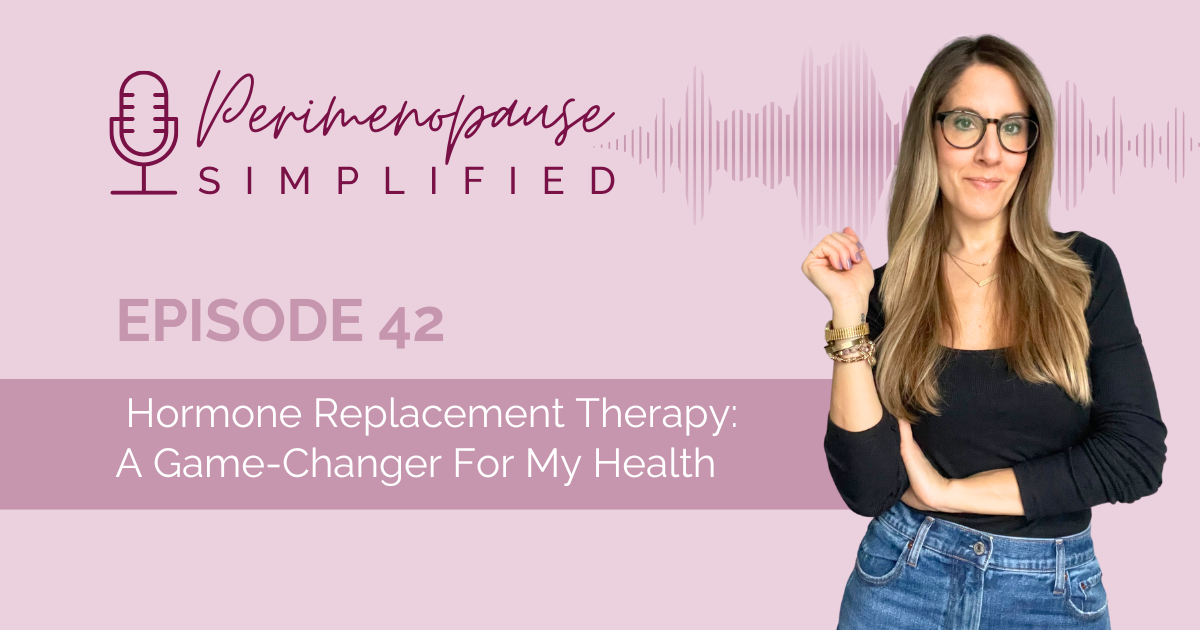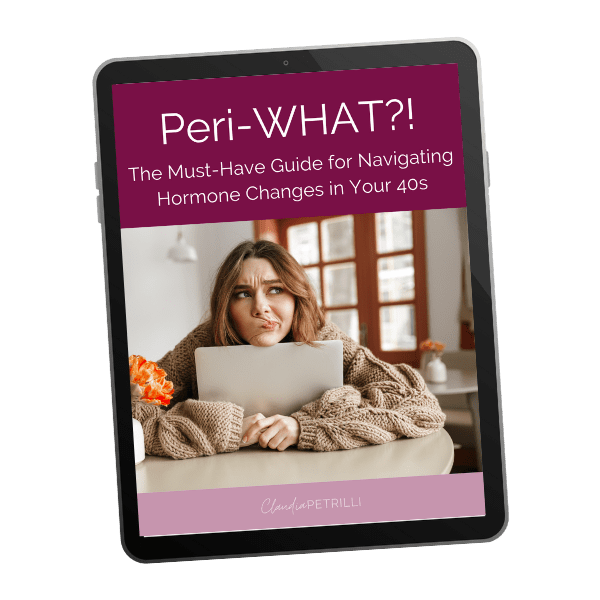
42. Hormone Replacement Therapy: A Game-Changer For My Health
Don’t Miss An Episode!
In this episode, we covered:
- Recognizing Symptoms of Hormonal Imbalance
- The Limitations of Diet and Lifestyle Alone
- The Role of Thyroid Hormones, Progesterone, and Estrogen
- Myths and Misconceptions Around HRT
- The Importance of Personalized and Balanced Hormone Therapy
Hey, welcome back to the show.
I truly hope you’re enjoying the Perimenopause Simplified podcast. This has been a labor of love, and we’ve received so many wonderful messages and emails from women who are loving it. In order to get more women to listen, please share it with the women in your life and leave a rating (preferably 5-star) and review. It takes less than a minute, and I’d truly appreciate it.
Hormones and Your Overall Health
Alright, so… by now, you should know how important hormones are for every function in the body and how important it is to consider the use of HRT, or hormone replacement therapy.
I’ve shared my story in earlier episodes and what led me to do this work. But I want to talk to you about what led me to start HRT and the difference it has made for me. I don’t think a lot of women can fully grasp the benefits hormones can have not only on their symptoms but on their relationships, their work, and their quality of life.
My Journey to HRT
After years of dealing with my own health struggles, taking HBC (hormonal birth control) for over a decade, and dealing with the ramifications of that, I knew I had to make changes. I realized conventional doctors couldn’t really help me, and eventually, I discovered functional medicine, which addresses root causes of symptoms. Through the food and lifestyle changes I made, I was thriving.
And during this time, I was coaching women on their hormone health and learning about the changes that occur prior to menopause. Then, somewhere in my mid-30s, things started to change for me.
Symptoms That Indicate Hormonal Imbalance
I started to experience joint pain—I remember getting pain flares that were quite debilitating and affected my workouts and my mood. If you’ve ever dealt with pain, you know how it can take over your life.
I never was one to experience anxiety, but I started to get shortness of breath, feel panicked, intense overwhelm, and I would have these “breakdowns” because I couldn’t handle stress.
I wasn’t able to fall asleep as quickly or stay asleep—and I’d wake up really fatigued.
I experienced vaginal dryness that made sex very uncomfortable for me and my partner, affecting intimacy and, in turn, our relationship.
I started to notice hair loss—clumps would come out in the shower.
I also noticed weight was much easier to gain and much harder to lose.
My periods started to get painful—and I hadn’t experienced cramps like that since I was a teen.
Then it was the brain changes—I could not focus, remember things, or finish certain tasks.
And I felt depressed, like a dark cloud looming over me.
And lastly, I started to experience urinary incontinence. When I would laugh, sneeze, or cough, I would pee a bit. At first, I would laugh. But I remember one day standing in the kitchen in pajama shorts, and I sneezed, and urine trickled down my leg. I felt so defeated because that’s not something you ever think will happen in your late 30s.
The Limitations of Diet and Lifestyle Alone
But these are real symptoms that women deal with every day. And they go to their doctor and leave with little to no solutions.
And I was doing all the things we’re told to do and what I educate about: eat a high-protein diet, consume ample fiber, walk 10k steps per day, lift weights, take supplements, prioritize sleep, and manage stress as best I could. But I was still experiencing symptoms.
And I see this with women all the time—they implement a lot of diet and lifestyle changes, yet they still don’t feel well. Weight is creeping up, anxiety is debilitating, sleep is crap, mood is all over the place, and cravings are uncontrollable.
Why Hormone Levels Are Critical for Optimal Health
Hear me when I say this: when your hormones are not at optimal levels, you simply will not have optimal health.
So when I was dealing with all those symptoms, I started to dabble in over-the-counter products like low-dose estradiol and progesterone. But I did not find much relief.
How Thyroid Hormone Support Changed My Health
In my late 30s, I decided to first get my thyroid supported with thyroid hormones. After starting thyroid hormone, my hair loss, energy, and weight improved.
However, my sleep, mood, joint pain, vaginal dryness, and urinary incontinence were still an issue.
The Transformative Power of Progesterone
So I started progesterone. My sleep, anxiety, and periods absolutely improved. It’s such an important hormone for women, and most of us are not making enough these days.
The Impact of Estrogen on Joint Pain, Muscle, and Mood
Then I went on estrogen. My joint pain practically vanished. I was able to increase my weight again, challenge myself in workouts, and start to build muscle that we so need.
My vaginal dryness improved. I’m still working on that a bit. But it’s certainly better than the desert I had before.
The depression that I had been dealing with for years lifted. It’s as if that heavy cloud finally disappeared. I used to wake up in the morning with a sense of dread, but now most days, I wake up excited to start my day.
The Misconceptions Around HRT
I share all this because I have seen firsthand what replacing your God-given hormones can do for you. And this education is not happening in most doctors’ offices. They are not trained in how to properly treat perimenopausal women. Instead, they’re giving you HBC or prescribing antidepressants, anxiety, or pain meds to deal with all these symptoms versus addressing the cause, which is suboptimal hormone levels.
Taking Action for Your Hormonal Health
I know what it’s like to be in your shoes and to feel overwhelmed and, quite frankly, defeated. It breaks my heart to see women struggling.
But…nothing will change if you don’t take action. No one will fight for you—you have to fight for you. You have to prioritize your health, get educated on how your body works, and what it needs to age well.
Food and Lifestyle Changes + HRT: A Powerful Combo
Now, it’s not a be-all and end-all. HRT is wonderful, but food and lifestyle changes are vital in your perimenopausal years. That said, you may not have the motivation or the drive to do all the things if you don’t have sufficient hormone levels. Those food and lifestyle changes only get you so far if you even have the energy and drive to do them. So, don’t feel like you have to wait necessarily. You can start HRT while you’re making those changes.
Why HRT Needs to Be Personalized
I know it can be scary because you’ve likely been told hormones are unsafe or they cause cancer. But people saying that are not hormone-literate or up-to-date on the research.
All that said, please know that what works for one person may not work for another. Like everything with health, HRT needs to be personalized to you.
Patience and Adjustments: The Reality of Starting HRT
When you start HRT, it takes time and patience to start to feel the benefits. It’s not “set it and forget it.” It can take weeks or a few months, depending on the woman.
And as you get older and get closer to menopause, your regimen will change. So it’s vital to work with a hormone-literate provider who can guide you through the process.
My own HRT regimen has changed—my thyroid hormone dosing has changed, I increased my estradiol and progesterone. And I will continue to do so (as needed), so I can feel my absolute best.
How to Navigate HRT with the Perimenopause HRT Roadmap
So if this episode resonated with you and you want to learn more, make sure you check out my brand-new, low-cost course, Perimenopause HRT Roadmap.
It breaks it all down for you, and will help you navigate the confusing world of HRT, find a qualified provider, and you’ll be well equipped to advocate for yourself and get the support you need.
You’ll also have the option to add on a private consultation with me to get your questions answered.
As always, check out the show notes, and I’ll see you next time!
Claudia Petrilli is a Functional Health Coach, Integrative Nutrition Coach, Women’s Health Educator, and creator of The Hormone Rescue program. Having experienced debilitating periods, digestive issues, a sluggish thyroid, a pituitary tumor, and perimenopause symptoms in her late 30s, she knows exactly what it’s like to get dismissed by doctors and spend years searching for answers.
NEW COURSE:
Free Resources:
Peri-What?! The Must-Have Guide for Navigating Hormone Changes in Your 40s
Programs:
Connect with Claudia:
Have a question or episode topic suggestion? Please email: claudia@claudiapetrilli.com.
Love the show? Please subscribe, leave a 5-star rating, review, and share with others, so more women can find this podcast for guidance and support through their perimenopause journey!






